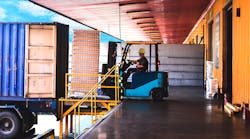One of my cherished possessions, tucked away in a dresser drawer at home, is a T-shirt from half a lifetime ago. It's a simple caricature of a whale. The dialog balloon above its head reads, "Save the Humans."
The message then, as now, was really about saving us from ourselves. Since the color green has come back into fashion, maybe the idea will stick this time. When it comes to transport packaging even the Big Box Boys are getting into the green act so you can be sure there's money to be made.
It's not always about money, however. Sometimes it's about shining the spotlight on yourself and sometimes it's about doing the right thing. An example of the former comes from the Web site Earthtimes.org, one of those wacky yet informative Internet places that serves up road kill from the edge of the information superhighway. For example, a rock band in the U.K., ReCoup (www.myspace.com/recoup), is packaging its latest CD in used potato chip bags. The band's music has an eco-friendly message, so reusing single-serve chip bags, turned inside out so the original graphics are hidden, makes a certain amount of Rock-N-Roll sense. It will use a recyclable label on the front to advertise the product. No mention of what it will do with the grease.
An example of doing the right thing, and a more serious effort, is a new package from Talecris Biotherapeutics (www.talecris.com), Research Triangle Park, N.C. The company has integrated environmentally friendly insulated shipping containers into what it calls its cold chain supply. The fully degradable container, manufactured by R.N.C. Industries (Norcross, Ga.), provides temperature protection necessary to transport Talecris' critical care treatments for people with life-threatening disorders.
Talecris produces therapeutic proteins from human plasma. These products must be kept under strict temperature and security controls from the time the plasma is obtained until the finished product is used. Distribution of these products is a special challenge. I talked with Jim Bacon, director of global demand planning for Talecris, about how his company approaches ecological issues and eco-friendly packaging.
"Plasma must be stored and transported at minus-20 degrees C to preserve the proteins," he says.To achieve this, Talecris uses four sizes of a containers made from "rock foam" (as he calls it) insulation material. The encapsulated material is made from seven naturally occurring rocks, crushed and melted, then woven into an industrial felt. The encapsulating material, a blue biodegradable wrap, is polylactic acid plastic made from wheat starch.
To accommodate various size products and customer orders, Talecris uses containers as small as six cubic inches (internal measure) to a large shipper measuring 24 inches on a side. Bacon adds, for 60 years the company has been focused on doing the right thing environmentally, however, foremost is the safety and integrity of its product.
"We've always been as environmentally conscious as we could be," he says. "It's a challenge in the pharmaceutical business since there are so many regulations about providing consumer information, etc., yet we still keep our packaging material to a minimum."
Therein lies the challenge for companies. Comply with regulations, provide necessary consumer information and do not use excessive material. Talecris, and a growing number of others, seem to be on the right track. As for smaller efforts like that of the boys in ReCoup? Well, rock on and save the whales.
Clyde Witt has been reporting on transport packaging issues and trends for more than 20 years.
The message then, as now, was really about saving us from ourselves.




